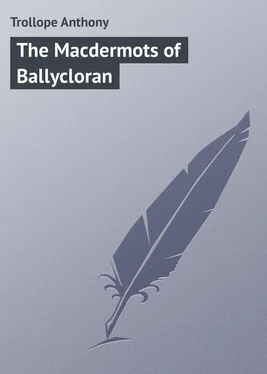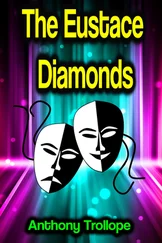Anthony Trollope - The Macdermots of Ballycloran
Здесь есть возможность читать онлайн «Anthony Trollope - The Macdermots of Ballycloran» — ознакомительный отрывок электронной книги совершенно бесплатно, а после прочтения отрывка купить полную версию. В некоторых случаях можно слушать аудио, скачать через торрент в формате fb2 и присутствует краткое содержание. Жанр: foreign_prose, на английском языке. Описание произведения, (предисловие) а так же отзывы посетителей доступны на портале библиотеки ЛибКат.
- Название:The Macdermots of Ballycloran
- Автор:
- Жанр:
- Год:неизвестен
- ISBN:нет данных
- Рейтинг книги:4 / 5. Голосов: 1
-
Избранное:Добавить в избранное
- Отзывы:
-
Ваша оценка:
- 80
- 1
- 2
- 3
- 4
- 5
The Macdermots of Ballycloran: краткое содержание, описание и аннотация
Предлагаем к чтению аннотацию, описание, краткое содержание или предисловие (зависит от того, что написал сам автор книги «The Macdermots of Ballycloran»). Если вы не нашли необходимую информацию о книге — напишите в комментариях, мы постараемся отыскать её.
The Macdermots of Ballycloran — читать онлайн ознакомительный отрывок
Ниже представлен текст книги, разбитый по страницам. Система сохранения места последней прочитанной страницы, позволяет с удобством читать онлайн бесплатно книгу «The Macdermots of Ballycloran», без необходимости каждый раз заново искать на чём Вы остановились. Поставьте закладку, и сможете в любой момент перейти на страницу, на которой закончили чтение.
Интервал:
Закладка:
This, then, was Feemy's lover, and she certainly did love him dearly; he had all the chief ornaments of her novel heroes – he was handsome, he carried arms, was a man of danger, and talked of deeds of courage; he wore a uniform; he rode more gracefully, talked more fluently, and seemed a more mighty personage, than any other one whom Feemy usually met. Besides, he gloried in the title of Captain, and would not that be sufficient to engage the heart of any girl in Feemy's position? let alone any Irish girl, to whom the ornaments of arms are always dear. But whether he loved her as truly, might, I fear, be considered doubtful; if so, why were they not married?
Larry Macdermot was too broken-hearted a man, and too low-spirited, to have objected to Myles on the ground of his being a Protestant: it was not that he was indifferent about his religion, but he had not heart enough left to be energetic on any subject. In other respects, Myles was more than a match for his daughter, in the present fallen condition of the family. But the matter had not even been mentioned to him by his daughter or her lover. Ussher was constantly at Ballycloran, – was in the habit of riding over from Mohill, only three miles, almost daily, when disengaged, giving his horse to Patsy, the only male attendant at Ballycloran, and staying the whole morning, or the evening, there, without invitation; and Larry, if he never seemed particularly glad, at any rate never evinced any dislike to his visits.
Whatever war the sub-inspector might wage against run spirits in the mountains and bogs, he always appeared on good terms with it at Ballycloran, and as the Macdermots had but little else to give in the way of hospitality, this was well.
Young Thady could not but see that his sister was attached to Ussher; but he knew that she could not do better than marry him, and if he considered much about it, he thought that she was only taking her fun out of it, as other girls did, and that it would all come right. Thady was warmly attached to his sister; he had had no one else really to love; he was too sullen at his prospects, too gloomy from his situation, to have chosen for himself any loved one on whom to expend his heart; he was of a disposition too saturnine, though an Irishman, to go and look for love when it did not fall in his way, and all that he had to give he gave to his sister. But it must be remembered that poor Thady had no refinement; how should he? And though he would let no one injure Feemy if he could help it, he hardly knew how effectually to protect her. His suspicions were now aroused by his counsellor Pat Brady; but the effect was rather to create increased dislike in him against Ussher, than to give rise to any properly concerted scheme for his sister's welfare.
On the evening previous to the fair at Mohill mentioned in the last chapter, Captain Ussher with a party of his men had succeeded in making a seizure of some half-malted barley in a cabin on the margin of a little lake on the low mountains, which lay between Mohill and Cashcarrigan. He had, as in these cases was always his practice, received information from a spy in his pay, who accompanied him, dressed as one of his own men, to prevent any chance of his being recognised; this man's name was Cogan, and he had been in the habit of buying illicit whiskey from the makers at a very cheap rate, and carrying it round to the farmers' houses and towns for sale, whereby he obtained considerable profit, – but at considerable risk. With this employment Captain Ussher had made himself acquainted, and instead of seizing the man whilst in possession of the whiskey, he had sounded him, and finding him sufficiently a villain, had taken him into his pay as a spy; this trade Cogan found more lucrative even than the former, but also more dangerous; as if detected he might reckon on his death as certain. He still continued to buy the spirits from the people, but in smaller quantities; he offered lower prices; and though he nominally kept up the trade, it was more for the purpose of knowing where the potheen was, than of buying and selling it.
It was not wonderful therefore that more seizures than ever had been lately made, and that the men were getting more cautious, and at the same time more irate and violent in their language. In the present instance the party had come on the cabin in question unawares; not that they might not have been noticed, but that the people were confident of not being suspected. No whiskey had been run there; and the barley had only lately been brought in turf kishes from another cabin where it was not thought to be safe.
Three men and an old woman were found in the cabin when Captain Ussher entered with three of his own men. On being questioned they denied the existence of either whiskey, malt, or barley; but on searching, the illicit article was found in the very kishes in which it had been brought; they were easily discovered shoved into the dark chimney corner farthest from the door.
"Dat I may never see the light," began the old woman, "if I thought it wor anything but the turf, and jist the kishes that Barney Smith left there, the morn; and he to say nothing of the barley, and bring all these throubles on me and yer honer, – the like of him, the spalpeen!"
"Never mind my trouble, my dear," said Ussher; "it is little we think of the trouble of easing you; and who's Barney Smith, ma'am?"
"Oh, then, Barney's jist my daughter's own son; and he coming down from the mountains with turf, and said he must lave the kishes here, till he just went back round Loch Sheen with the ass, he'd borrowed from Paddy Byrne, and he'd be – "
"And very good natured it was of him to leave you the malt instead of the turf; and who are you, my good men?"
The men had continued smoking their pipes quietly at the fire without stirring.
"We be sthrangers here, yer honer," said one; "that is, not sthrangers jist, but we don't live here, yer honer."
"Where do you live, and what's your names?"
"I and Joe Smith live down away jist on the road to Cash, about half a mile out of this; and Tim Reynolds, he lives away at Drumleesh, on Mr. Macdermot's land; and my name's Paddy Byrne."
"Oh, oh; so one of you is father of the lad who brought the donkey, and the other the owner of it; and you neither of you knew what was in the kishes."
"Sorrow a know, yer honer; ye see Barney brought them down here from the mountains when we warn't in it; and it war some of the boys up there was getting him to get away the malt unknownst, hearing of yer honer, maybe."
"Ah, yes I see – whose land is this on?"
"Counseller Webb's, yer honer."
"Who holds the cabin and potato garden?"
"I do, your honer, jist for my wife's mother, ye see; but I live down towards Cash."
"Ah, very good-natured of you to your wife's mother. I hope the three of you have no objection to take a walk to Mohill this evening."
"Ochone, ochone, and it's ruined we'll be, yer honer; and that I may never see the light if the boys knew it; and yer honer wouldn't have the death of an ould woman on ye!" the old woman was exclaiming, while the police began seizing the malt and making prisoners of the men.
"Carol, see and get an ass to put these kishes on," said Ussher. "Killeen, pass a rope across these fellows' arms; I suppose they'll go quiet."
It was now full time for the men to arise when they found that the rope was to be fastened across their arms; which meant that a rope was to be fastened on the right arm of one, passed behind his back, fastened to the arm of the second, and so behind his back to the third. Smith and Byrne, the former of whom in spite of his protestations to the contrary was the inhabitant of the cabin, had given the matter up as lost; but as the other, Tim Reynolds, did in fact reside at Drumleesh, he thought he might still show some cause why he should not be arrested for visiting his friend Joe Smith.
Читать дальшеИнтервал:
Закладка:
Похожие книги на «The Macdermots of Ballycloran»
Представляем Вашему вниманию похожие книги на «The Macdermots of Ballycloran» списком для выбора. Мы отобрали схожую по названию и смыслу литературу в надежде предоставить читателям больше вариантов отыскать новые, интересные, ещё непрочитанные произведения.
Обсуждение, отзывы о книге «The Macdermots of Ballycloran» и просто собственные мнения читателей. Оставьте ваши комментарии, напишите, что Вы думаете о произведении, его смысле или главных героях. Укажите что конкретно понравилось, а что нет, и почему Вы так считаете.












